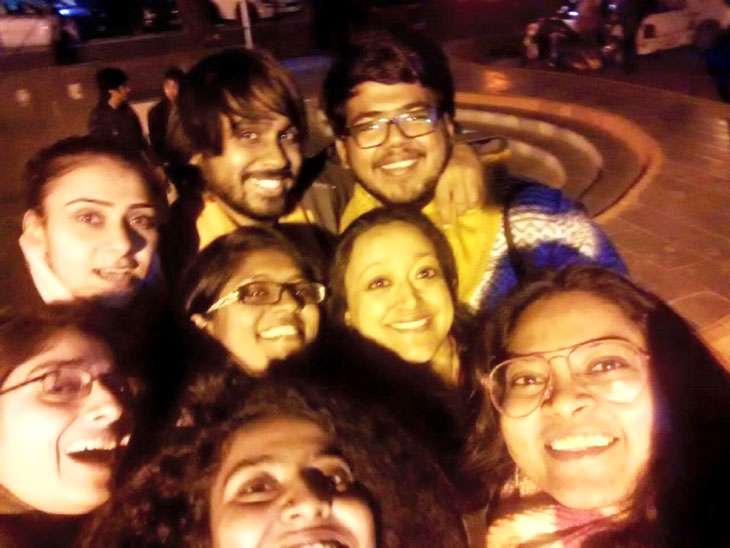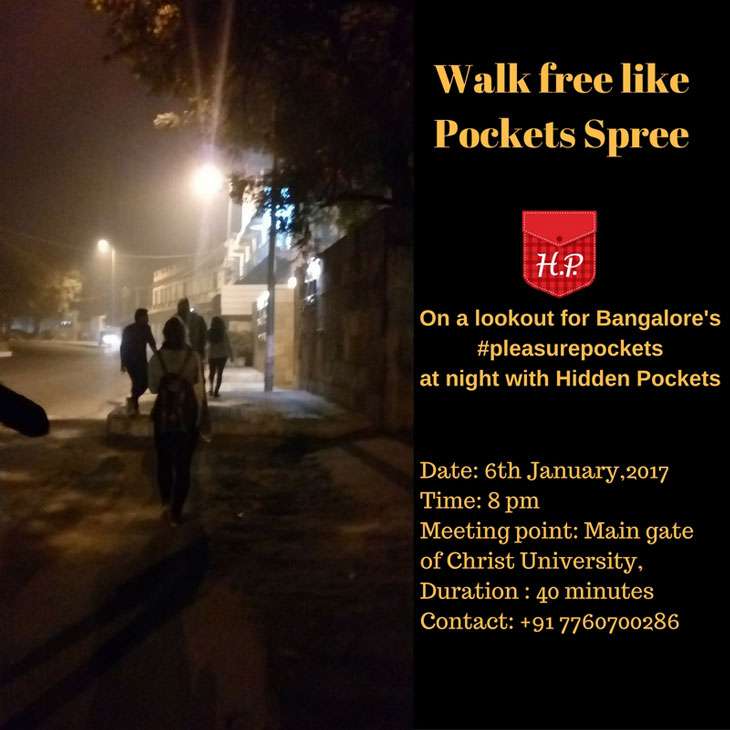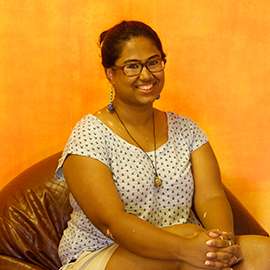
"We are a Feminist Start up talking about cities and pleasure."
That's the one line with which Hidden-pockets, an organisation looking to reclaim spaces for pleasure in the city, identifies itself with on its website.
It isn't an easy concept to understand, for we have endured years of conditioning that tell us to get done and get home. Cities, Indian cities in particular, aren't spaces to soak in, to walk around, to experience.
Constantly threatened by the lack of safety, we make a dash from one building to the next, never stopping to find pleasure in the city, outdoors, as it is.
With the increasing pitch in conversations about women's safety in cities, the relevance of a start-up like Hidden-pockets increases. Because it's one thing to tutor women how to equip themselves against harm, but how often do we let them identify their comfort zones?
But these experiences are subjective, agrees founder of Hidden-pockets Jasmine Lovely George. In a conversation with Catch, she explains the two elements that form the backbone of her organisation.
"Will two women ever agree on the way they look at safety? What can one do? How can gender be a part of the narrative for a city's development or urban planning? That's one element of Hidden-pockets.
"The other is a response," she says. "I have been working with Sexual Reproductive Health Rights for three years and initially when I was looking for services, say abortion services in a city, I found it fascinating that most of my friends, colleagues, would [point me towards] private sector. I was surprised that nobody ever would point me towards government hospitals."
The idea, then, is to map the city, according to services, conveniences, safety, and of course, pleasure.

Excerpts from the interview:
DS: What made you start Hidden-pockets? Why do you do what you do?
JG: Basically, it was a response to the safety apps that were going viral post the Nirbhaya incident. Everyone was talking about occupying spaces, how cities were unsafe, and I was very scared of the kind of discourses that were coming out of it. I was scared of the counterproductive nature of the arguments... Any way it has been so difficult for women to come out in public spaces.
DS: Wait, what do you mean by counterproductive arguments?
JG: Well a very good example is Nirbhaya. Nirbhaya happened, the law that came out after that... everything became very repressive for women themselves. First of all [it was a] knee-jerk response, then more tech applications came out that put the burden on women, [saying] how you're responsible for your safety. And suddenly, even if women wanted to have any conversation around pleasure, desire, immediately they would've been told "Safety is the first thing, look at the cities around you."
This was one angle, the other angle was [about defining safety]. If you want to define my safety, let me define it. If you are too concerned about my safety don't ask for a CCTV, ask me what places I would like in my kind of a city.
For instance, we're doing this #MakeYourCityInclusive campaign, where we're actually going and asking women from different cities... Women are telling us which public places they like going [to] and why they like going there.
DS: And this isn't limited to India, right? I saw some posts from international cities on your website.
JG: Yeah, so initially it started with Indian cities. But then we got demands from other places. Like Abuja in Nigeria, even from Mexico. [Their concerns] are similar as in our cities. [They say] "Nobody has asked us what kind of city I would like to envision."
DS: Your work isn't limited to women though?
JG: So when we started, it was [mostly] women. Then with time, it became disabled-friendly, then transpeople-friendly. Because with time, you also realise gender and access to places [play out in different ways].
Then with time I also learnt about accessing places. For example, Mehrauli at night becomes inaccessible for a lot of people in the head, because it's 'unsafe'. But when we go for walks, a lot of my trans friends find it safe because [Mehrauli] a more inclusive space [for them].
I learnt the word 'access' from disability activists. I met with an accident and that was the first time I realised that despite all my rights and laws, I couldn't be a pedestrian, I couldn't cross the road. Access - that's the common ground for all of us to come together.
DS: A friend recently said that 'I don't think I quite understand what they do.' I found myself at a loss for words while explaining. Do you think your work isn't tangible?
JG: I agree with you on that. After a panel [discussion] yesterday the publisher comes and tells me, "You know what Jasmine, I'm so glad you read the book in detail because half the time I find it very difficult to sell the book, because the book is not simple enough."
"The nuances fail on the public." Those were exactly her words, and I understand, except for the last two years [I've dealt with] people who want Hidden-pockets to be very simple. This is also something I'm struggling with.
When people ask me "What is it about?" [I wonder] why pleasure is such a difficult narrative to map a city. When we go for walks, I can't make people walk. For people to make that journey from 'What?' to 'Why?' a lot of reasoning, conversations must be done.
So I completely understand and accept this blame that it hasn't been simplified enough, but there's also a little bit of stubbornness that I don't want it to be simple either.
DS: Delhi, I understand, was the focal point for your work [with regard to walks]. Yet, the New Year Eve's Bangalore incident took you there?
JG: I need to clarify this. Our walk wasn't in response to the Bangalore molestation. I take classes in Christ College for feminist jurisprudence, and instead of doing a class in the classroom I decided to take the class outside. It just happened that the incident happened on 31 December, because even during the walk, I said it very clearly that it wasn't a protest.
I was very scared that the same [reactions] that happened in Delhi post Nirbhaya were happening in Bangalore. I couldn't imagine the [kind of things being said]. 'The next Delhi', 'Bangalorean outsider', 'lower income groups', 'Muslims'... [These sort of questions] came up [during the walk], and came up very strongly. I was surprised, these were 20-year-old law students asking these questions.
Even during the walk I didn't give them an answer. I just wanted to ruffle their comfort zones.

DS: So, is there a story behind the name 'Hidden-pockets'?
JG: Oh yes. Mostly, we wanted something that would force people to click, and also it was very mischievous. It took a long time, 6 months. Because we (Jasmine and the co-founder who left) never agree on anything.
Also, we didn't want a boring name. We wanted something that was fun, and also pockets is a reference to the city. We all travel in pockets, we all live in pockets, have pockets of memories.
DS: Okay, what initiatives have you undertaken to sensitise men? How big a part of this dialogue are they?
JG: Actually, they're not at all a part of it. What I mean is, I wouldn't want to make a gender distinction. [Instead of men and women] I see it as feminists and non-feminists.
So yes, I did work with non-feminists. Techies, who were men, and it didn't work out. I don't blame them, but I automatically found myself explaining [myself] which I didn't need.
But in our walks, definitely men come. In our workshops too men come. Boys come. I'm a huge supporter of [including] boys and in most of my workshops I let them talk. They often say the most politically incorrect things, which is a good thing [because it can then be discussed].
In our Bangalore walk there was an RSS fellow. I was the only one who didn't want to stop him. At the end of the walk he said, "I won't ever agree with you, but it was a pleasure meeting you."
That's a good start.
DS: Lastly, what do you mean by 'pleasure pockets'? Have you found any?
JG: That's a difficult question. Over time, I have changed my understanding of pleasure. From a theoretical understanding it's very [complicated], but I would say it's any place where I can smile. I love [and get 'pleasure' from] public spaces where people perform - artists on the road, someone playing violin in the metro station...
First published: 13 January 2017, 0:11 IST







![BJP's Kapil Mishra recreates Shankar Mahadevan’s ‘Breathless’ song to highlight Delhi pollution [WATCH] BJP's Kapil Mishra recreates Shankar Mahadevan’s ‘Breathless’ song to highlight Delhi pollution [WATCH]](https://images.catchnews.com/upload/2022/11/03/kapil-mishra_240884_300x172.png)

![Anupam Kher shares pictures of his toned body on 67th birthday [MUST SEE] Anupam Kher shares pictures of his toned body on 67th birthday [MUST SEE]](https://images.catchnews.com/upload/2022/03/07/Anupam_kher_231145_300x172.jpg)






